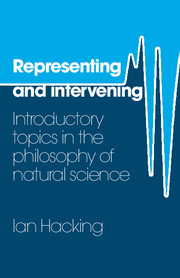Book contents
- Frontmatter
- Acknowledgements
- Contents
- Analytical table of contents
- Preface
- Introduction: Rationality
- Part A Representing
- Part B Intervening
- 9 Experiment
- 10 Observation
- 11 Microscopes
- 12 Speculation, calculation, models, approximations
- 13 The creation of phenomena
- 14 Measurement
- 15 Baconian topics
- 16 Experimentation and scientific realism
- Further reading
- Index
- Frontmatter
- Acknowledgements
- Contents
- Analytical table of contents
- Preface
- Introduction: Rationality
- Part A Representing
- Part B Intervening
- 9 Experiment
- 10 Observation
- 11 Microscopes
- 12 Speculation, calculation, models, approximations
- 13 The creation of phenomena
- 14 Measurement
- 15 Baconian topics
- 16 Experimentation and scientific realism
- Further reading
- Index
Summary
Commonplace facts about observation have been distorted by two philosophical fashions. One is the vogue for what Quine calls semantic ascent (don't talk about things, talk about the way we talk about things). The other is the domination of experiment by theory. The former says not to think about observation, but about observation statements – the words used to report observations. The latter says that every observation statement is loaded with theory – there is no observing prior to theorizing. Hence it is well to begin with a few untheoretical unlinguistic platitudes.
1 Observation, as a primary source of data, has always been a part of natural science, but it is not all that important. Here I refer to the philosophers' conception of observation: the notion that the life of the experimenter is spent in the making of observations which provide the data that test theory, or upon which theory is built. This kind of observation plays a relatively minor role in most experiments. Some great experimenters have been poor observers. Often the experimental task, and the test of ingenuity or even greatness, is less to observe and report, than to get some bit of equipment to exhibit phenomena in a reliable way.
2 There is, however, a more important and less noticed kind of observation that is essential to fine experimentation. The good experimenter is often the observant one who sees the instructive quirks or unexpected outcomes of this or that bit of the equipment.
- Type
- Chapter
- Information
- Representing and InterveningIntroductory Topics in the Philosophy of Natural Science, pp. 167 - 185Publisher: Cambridge University PressPrint publication year: 1983



